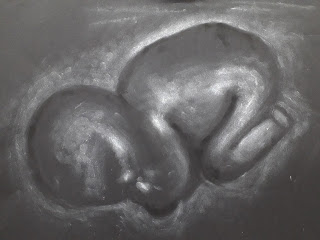In the 3rd and final session with Anne Teahan on drawing space and light we were putting together what we'd learnt in the previous 2 classes in 1 large sustained drawing.
As a bit of homework I'd done a quick trial comparing the usual City Lit heavyweight cartridge paper ( which is actually very good, it comes from R K Burt ) with some Clairfontaine watercolour paper . I was wanting something with a bit more 'tooth ' to hold the charcoal and liked the effect of the back of the watercolour paper ( channeling my inner Seurat!) But I found a whole A1 sheet was too stiff to roll up for the class so City Lit cartridge it was.
The easels were already set up around a selection of still life objects ( to which we contributed some items - spot my pewter pot!) , lit from 1 side to cast strong shadows.
The aim was to build up a background of space with depth made up of many ghostly layers of charcoal marks ( or with chalk fingerpints on black paper ) and then integrate the objects and shadows. I'd liked how the organic lines had worked in the first week's drawing ( above) so wanted to do something similar .
I struggled however with the drawing of the objects and shadows. When Anne came to talk to me , she pointed out how static and safe my observational drawing was in comparison to the energy of the background and suggested I return to the drawings I'd done in the first week based on Antony Gormley's 'Feeling Material' (below)
Much more satisfactory, using the overlapping spirals to describe the form, matching the marks in the background and actually more of a 3D quality
Then the shadows changed with light pouring in from a window and the paper just wouldn't take any more charcoal and my eraser was making no impression introducing lights. Time to call a halt.
When we running out of steam , we looked through some slides of Ben Nicolson works ( similar to those below) to get some ideas of how to integrate backgrounds and objects to create a cohesive whole. Some way to go in that regard!
At the end of the session when Anne looked at my final piece she said she'd hesitated whether to tell me to consider changing the way I was drawing but I'm so glad she did! It must be difficult for tutors who don't know the students that well to gauge whether a student is open to taking on board criticism.
Sub-consciously, observational drawing for me is bound up with botanical/scientific drawing as part of my job, doing it accurately , 'properly'. Recognising the energy, liveliness in my process of 'just' mark -making, I feel like Anne has given me permission to apply that to observational drawing too. I was a scientist but now I'm an artist.








































